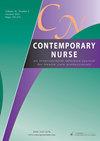Common Sense Model program on illness perceptions in patients with impaired awareness of hypoglycemia
IF 2.1
4区 医学
Q3 NURSING
引用次数: 2
Abstract
Background: Illness perceptions are important for patients with insulin-treated type 2 diabetes mellitus (T2DM) and impaired awareness of hypoglycemia (IAH), as they determine health-related behaviors and motivations. Patients with IAH in many countries have poor illness perception, and there is a paucity of research exploring the effectiveness of Common Sense Model (CSM)-based interventions in this population. Objective: To investigate the effects of a CSM-based intervention program on perceptions of illness in patients with insulin-treated T2DM and IAH. Design: Quasi-randomized controlled trial. Methods: 78 patients with IAH receiving routine care were included. The intervention group (n = 39) participated in a CSM-based program, whereas the control group (n = 39) did not. Illness perceptions, coping styles, hypoglycemia fear, and awareness of hypoglycemia at baseline, 1, and 3 months were analyzed and compared between the two groups. Results: The intervention group exhibited significant improvements in consequences (β = -1.615, P = 0.032); personal control (β = −1.897, P = 0.006); treatment control (β = −1.274, P = 0.046); and positive coping style (β = 4.872, P = 0.002) at the 3-month follow-up, and timeline (β = 2.769, P = 0.004) at the 1-month follow-up. Hypoglycemia fear and awareness were not significantly improved in the intervention group compared with the control group. No intervention-related adverse events were observed. Conclusions: A CSM-based intervention program can modify illness perceptions to an extent and improve the positive coping style in patients with IAH. Impact statementNurses should conduct a CSM-based intervention program to help patients with IAH improve illness perceptions.对低血糖认知受损患者疾病认知的常识模型项目
背景:疾病认知对于胰岛素治疗的2型糖尿病(T2DM)和低血糖认知受损(IAH)患者很重要,因为它们决定了与健康相关的行为和动机。在许多国家,IAH患者的疾病认知能力较差,并且缺乏探索基于常识模型(CSM)的干预措施在这一人群中的有效性的研究。目的:探讨基于csm的干预方案对胰岛素治疗的T2DM和IAH患者疾病认知的影响。设计:准随机对照试验。方法:78例IAH患者接受常规护理。干预组(n = 39)参加了基于csm的项目,而对照组(n = 39)则没有。分析比较两组患者在基线、1个月和3个月时的疾病认知、应对方式、低血糖恐惧和低血糖意识。结果:干预组患者预后有显著改善(β = -1.615, P = 0.032);个人控制(β = - 1.897, P = 0.006);对照组(β = - 1.274, P = 0.046);3个月时积极应对方式(β = 4.872, P = 0.002), 1个月时积极应对时间(β = 2.769, P = 0.004)。与对照组相比,干预组对低血糖的恐惧和认知无明显改善。未观察到干预相关的不良事件。结论:基于csm的干预方案能在一定程度上改变IAH患者的疾病认知,改善其积极应对方式。影响陈述护士应实施基于csm的干预计划,帮助IAH患者改善对疾病的认知。
本文章由计算机程序翻译,如有差异,请以英文原文为准。
求助全文
约1分钟内获得全文
求助全文
来源期刊

Contemporary Nurse
医学-护理
CiteScore
2.00
自引率
6.20%
发文量
38
审稿时长
6-12 weeks
期刊介绍:
Contemporary Nurse is an international peer-reviewed journal designed to increase nursing skills, knowledge and communication, assist in professional development and to enhance educational standards by publishing stimulating, informative and useful articles on a range of issues influencing professional nursing research, teaching and practice.
Contemporary Nurse is a forum for nursing educators, researchers and professionals who require high-quality, peer-reviewed research on emerging research fronts, perspectives and protocols, community and family health, cross-cultural research, recruitment, retention, education, training and practitioner perspectives.
Contemporary Nurse publishes original research articles, reviews and discussion papers.
 求助内容:
求助内容: 应助结果提醒方式:
应助结果提醒方式:


